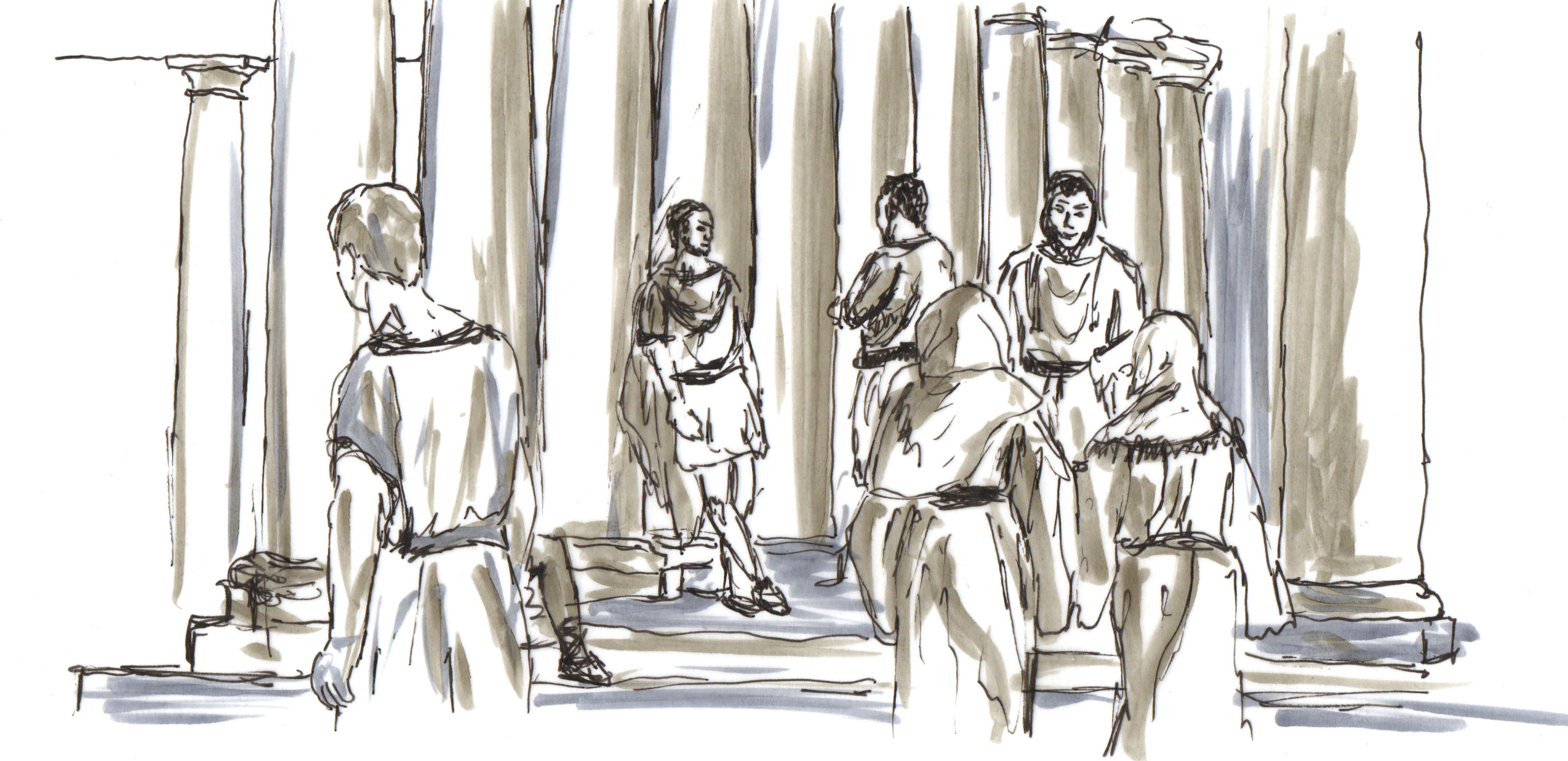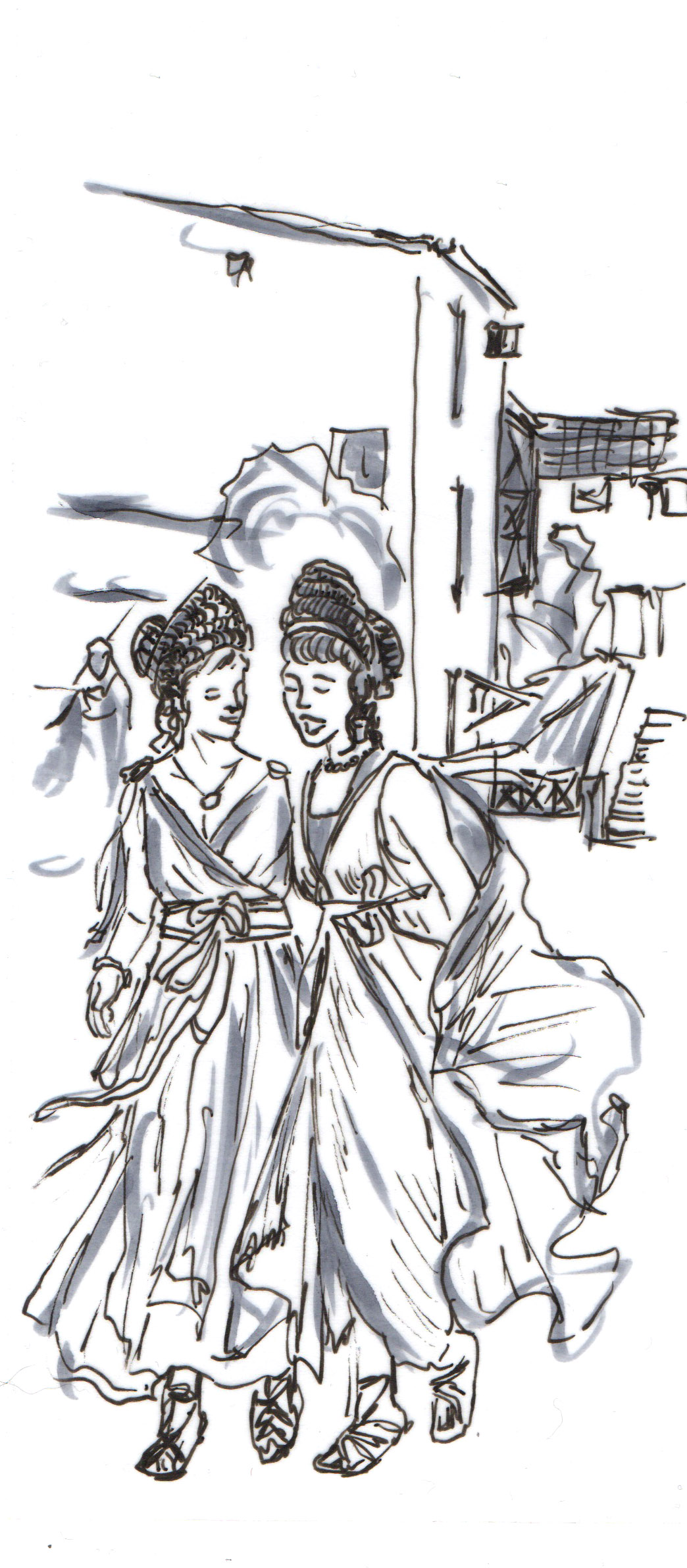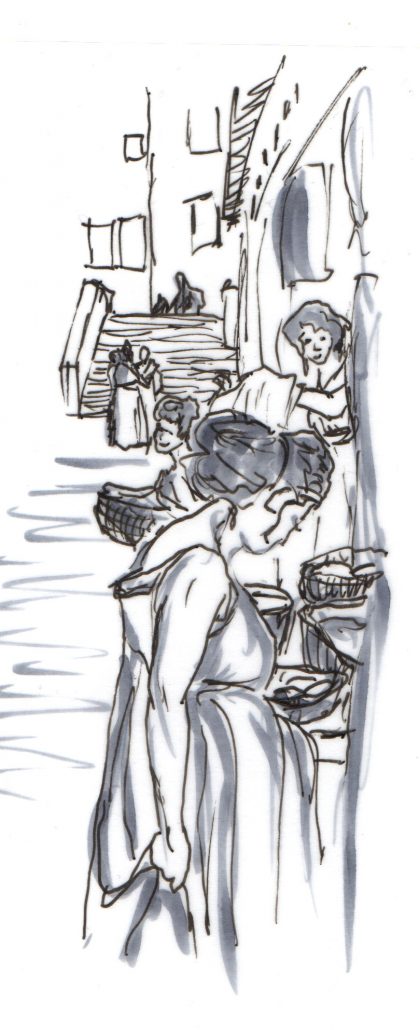Daily Routine
A Roman’s day starts early in the morning, when slaves assist their masters in dressing themselves while also providing them with little snacks and cups of warm, watered-down wine. The masters then usually receive their clients and thank them for their time with little presents (usually money). They then instruct their clients, release them into their day, or take them along to visit their own patrons, offering their services as clients themselves.
After this start citizens usually go to the forum to meet acquaintances and friends, work or to be a spectator at an entertaining law court or sacrificial ritual.
At noon the cookshops (cauponae) at the forum sell nutritious food. In the afternoon most people do not have to work anymore so they meet friends, visit the thermae or go to see a play. On rare occasions gladiator fights or big rituals are being held. In the evening it is time for the principal meal of the day. For this the whole city comes together in the tavern to enjoy one last drink before going to bed quite early. After all, a new working day is waiting.
The only ones roaming the streets at night are shady figures who need to hide in the dark. Those are usually Christians meeting secretly, or bandits pursuing their criminal business.
Hygiene
The Romans are a cleanly people. Bathing in official bathhouses is an integral part of daily routine, and may be the most important social ritual of everyday life. The thermae are a place of communication and leisure: People meet, relax and wash off their daily stress. The place provides massages, manicures and pedicures and sufficient space for gymnastics exercises. The entry fee is kept very low so even slaves are able to visit the thermae. Men and women both attend the same bathhouses, albeit at different times.
After entering the thermae there is a changing room to get undressed in, and where visitors can store their clothing. People heat up in the sudatorium (sweating-room) before pouring cold water over themselves. The next step involves cleaning oneself with a strigilis, getting oiled up and getting a massage. After the massage guests usually perform gymnastics exercises in the garden, during which women often wear a kind of bikini. As people usually visit bathhouses in the afternoon, those crowded and noisy places often upset the neighbors.
Money
The game Scarbantia is not trying to be an economic simulation. Still, money plays a part. A lot of Scarbantians are only able to survive based on donations from their patrons or politicians. Others are highly indebted. The civil war, on top of everything else, does nothing to alleviate the crushing tax burdens.
The most common currency is the As, a chunky copper-coin. The Sestertius, made from bronze or brass, will also be dealt with quite frequently, whereas the Denarius, made from silver, might be sighted only occasionally by most Scarbantians. Conversely, the golden Aureus will be wholly unfamiliar to most of them.
For Scarbantia the As (copper-coin) will be used as a food-coupon. Everyone can get them from the game-masters at any moment during the game. This is a game-mechanism that will ensure an equal food-supply for all players, independent of their in-game status. If you decide to be dependent on you ingame-skills, donors, or if you want to starve yourself for the sake of immersion, that’s your personal decision.
Gangs
The true power in Scarbantia obviously lies in the hands of gang-bosses, who have a stranglehold on the city by dint of their collegium (gang). Theses gangs derive from the traditional and politically influential “circus factions” in Rome. They name themselves after the colors of the teams participating in horse-races at circus maximus.
Until some months ago the city was ruled by the dominant collegium veneti, the blue gang. But as their dux (chief) apparently left the city to support general Decius in the war against the emperor Philippus Arabs, his vicarii (deputies) erupted in dispute and the collegium split in two. With the new collegium leukoi, which arose from this division, a new player entered the game of power. Seizing the opportunity the collegium prasinoi, which was oppressed by the mighty venetoi for the longest time, rose to new power as well. Now the city of Scarbantia is divided in three gang territories of equal size and power.
Venetoi: The blue gang. Was once the dominant collegium. Their wealth and power is based on the trade with slaves.
Leukoi: The white gang. Was once a part of the venetoi but is now at odds with them. Their wealth and power is based on lending money
Prasinoi: The green gang. Was forced to act secretly for some time and has risen to new power recently. Their wealth and power is based on grain-speculation and prostitution.
| Food-Coupon | 1 As (Copper) |
| Base Currency ( = 4 Asses) | 1 Sestertius (Brass) |
| 4 Sestertii = | 1 Denarius (Silver) |
| 100 Sestertii = 25 Denarii = | 1 Aureus (Gold) |
| Bread | 1 As |
| Wine | 1 Sestertius |
| Shaving | 2 Sestertii |
| Visiting the Bathhouse | 2 Sestertii |
| Clay Bowl | 3-5 Sestertii |
| Prostitute | >1 Denarius |
| Aborticides | 1-2 Denarii |
| Book (Scroll) | 1-5 Denarii |
| Tunic | 3-4 Denarii |
| Toga | 5-50 Denarii |
| Slave | 10 -1000 Aurei |
Zeitgeist
The Romans are proud people. Dignitas (dignity) and gravitas (Seriousness) dictate their lives, if they can afford it. These values are also reflected in Roman laws. A citizen may not be castigated in public and may be able to settle many convictions by paying fines. Unlike slaves and foreigners, citizens who are sentenced to death will be killed by the sword rather than on the cross.
Even if Romans try to live in seriousness and dignity, they may be quite rude and bawdy if the situation allows it. One may praise the delicate tones of the Lyra at one moment and at the next moment show an opponent the digitus impudicus (middle finger).
Additionally, while men might expect women to act well-behaved and submissive, their wishes are all too often ignored. By law the woman is subject to the man, but reality looks differently. Nevertheless, women have fight for their influence, often by tactical maneuvering, to follow men on the road to power or equality.
Romans are well aware of their bodies and a healthy one is reckoned beautiful and desirable. Physicalness and nudity are part of everyday life and are not ill-reputed or bedeviled (except maybe by the Christians). Positively connoted omnipresent phallic symbols beautify walls and jewelry, sex-scenes are painted on internal walls of brothels and private homes alike for decorative reasons.
Humans do not count as equal and human rights in a modern sense do not apply for Romans. The worth of a slave may be assessed in money, while the emperor is apotheosized. One will become what one is born into – the status of one’s father determines one’s life. A slave’s offspring will have to brace themselves for a hard life in slavery. Craftsmen and –women learn from their parents, and politicians supply their descendants with influential positions. That no one should try to escape one’s fate is written even in the oldest tales. Of course that does not mean that nobody is able to rise or fall in status. Slaves are released into freedom, aristocrats sink into poverty. One might even be favored by one’s patron or donor – at the price of a subsequent favor, of course.
Manly virtues like honor, strength, discipline and frugality are valued. Exaggerated luxury is dismissed as weakness, but is nevertheless indulged. Bodily training has the same significance as mental training, and one pays heed to personal hygiene throughout all social stratums.
Language
In Scarbantia one talks Latin, which will be represented by the German language for the purpose of our game. However, we encourage the use of latin phrases such as “salvete” ( for hello) and “vale” (for goodbye).
In Latin there is no polite form of language. Everyone addresses everybody else informally, although slaves may call free people or their masters dominus or domina. Amenities like “Please” or “Thank you” are only appropriate between people of the same status, or in face of one’s social surperiors.
The language of the German tribes, aka ingame-German, will be represented by English.
Eating Habits
The Roman cuisine precedes many foods we take for granted today, most of which were later imported from the Americas, such as tomatoes, potatoes, pepper, chocolate, corn, etc. Meals are often seasoned with garum, a salty and umami fermented fish-sauce, as salt itself is expensive.
(We will provide you with coffee and chocolate in off-game-zones. Vegetarian and vegan meals will be prepared without fish-sauce.)
Many Romans live in tenement houses (insulae), and their small rooms do not include a kitchen. Therefore they buy their daily food at little cookshops at the local forum, which tend to be the hotspot for chit-chat and social meet-ups.
Romans eat their main-meal (cena) in the evening, either at home surrounded by their families, or at the tavern. Breakfast has no importance in roman culture and one often eats some dry bread accompanied by warm watered down wine. But porridge (pulsum) with fruit is also popular. For lunch, Romans visit the cookshops (cauponae) at the forum.
The main beverage, beside water, is wine, which will always be thinned with water. Drinking pure wine would be quite barbaric. Sweetened and spiced wine (conditum paradoxum) enjoys great popularity. Simpler, cheaper and less alcoholic is posca, water flavoured with a shot of vinegar.





